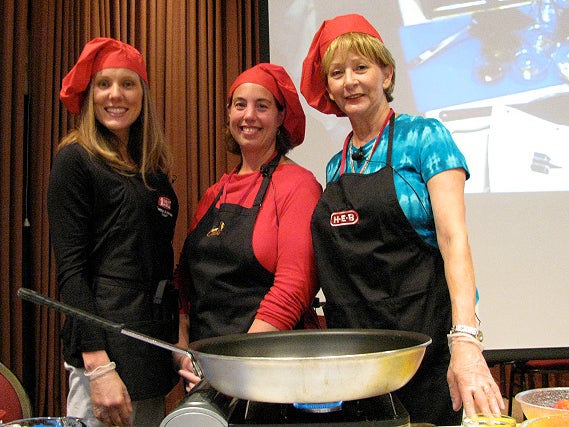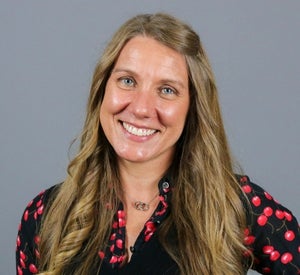Sometimes a student’s journey at SHRS comes full circle! Assistant Professor and Community Coordinator Caroline Passerrello studied psychology as an undergraduate student at Pitt, then went on to excel in the Bachelor of Science in Clinical Dietetics and Nutrition program—the former name of SHRS’ Master of Science Dietitian Nutritionist program.
Her academic pathway to becoming a Registered Dietitian Nutritionist (RDN) is called the post-baccalaureate (post-bacc) entry point. This entry point is for students who received a bachelor’s degree that was not from an accredited didactic program in dietetics (DPD) and is one of three entry points for the Dietitian Nutritionist program.
Now as a faculty member, Passerrello utilizes her passion for nutrition and her experience as a student in the program to impart knowledge onto the students she teaches.
Read more to learn about Passerrello’s background, her experience in the program and why she returned to SHRS.
—
What was your background before entering the former Bachelor of Science in Clinical Dietetics and Nutrition program?
I was completing my undergraduate degree in psychology at the University of Pittsburgh when I learned of the nutrition program at Pitt. I worked with my advisors to begin taking all the pre-requisites for the program while I completed my psychology degree. I returned to school for a Bachelor of Science in clinical dietetics and nutrition immediately after graduating with a Bachelor of Science in psychology.
How did you get interested in nutrition overall? Why are you passionate about it?
I was always intrigued with the bidirectional relationship between mood and food. Once I had a psychology degree, I felt I had a better understanding of the “mood” side of things and wanted to dive into the food portion.
What was your experience like in the program?
SHRS faculty spotlight video on Caroline Passerrello, featuring her mentor and retired faculty member Judy Dodd.
My experience was from 2003-2005, so the program was a lot different from the current structure. I was not very strong in the prerequisite science courses, so there were some folks at SHRS at the time that deterred me from applying to the rigorous program. However, there was one faculty member, Judy Dodd (now retired), that saw my passion for community nutrition and my strength in delivering nutrition education. She guided me through the program, provided endless support and encouragement and continues to be my mentor and advocate today.
Where did your professional path lead you after graduation?
Caroline Passerrello in a video recorded for Giant Eagle, where she developed a nutrition and wellness program.
Immediately after graduation, I began work as a clinical dietitian in Virginia. My position was split between in-patient and long-term care. This role confirmed I was better suited for preventive, or proactive, care. I looked to Pitt to explore options to further my education in this area and I returned the following year to complete a master’s degree in the Wellness and Human Performance program (a former program at SHRS).
During that time, I worked as a clinical dietitian and started a nutrition consulting business for individuals and corporations. After a few years on my own, I joined Giant Eagle, Inc. and developed a nutrition and wellness program for them—growing the team of dietitians from just myself to 23 at our highest point.
I left Giant Eagle to resume my own business in consulting and started teaching at Pitt in 2013 as an adjunct faculty member. I started teaching more and consulting less, went back to school again for my doctorate in nutrition through Pitt’s School of Education and am still teaching (full time) and consulting (part time) today.
What drew you back to SHRS as a faculty member?
I was drawn back in by our previous program director, Deborah Hutcheson, and my mentor, Judy Dodd. They had a vision for the future of the program, one that included entrepreneurialism, business acumen and nutrition communications and knew I had the skillset to match her vision. I have a strong love of learning and knew working as faculty would afford me the opportunity to learn alongside the students.
What strengths do you see with students who enter the post-bacc entry point?
Because I had an extra year of classes and experience when I started, I came to the nutrition program with a different perspective. I brought a broader view of the health care landscape coupled with a narrow focus on my career goals. I also understood the value of experiential learning and took advantage of every opportunity I could to learn supervised application in the field. Now as a faculty member, I notice a trend that our post-bacc students tend to be more involved in experiential learning opportunities right from the beginning.
What do you see as beneficial about the post-baccalaureate entry point for students today?

Entering into the program as a post-bacc provides an opportunity for students to see how connected nutrition really is to other degrees and fields. With a strong knowledge base in another area, students can see how their existing skills transfer to nutrition and dietetics and begin to make connections within the nutrition material that will help them be more relatable in the field.
What do you enjoy about being a faculty member within the department you studied in?
Even though many years have passed, and program structures have changed, I still understand what it was like to be a student in the program—I took classes from some professors who are still teaching, so I can empathize with students.

